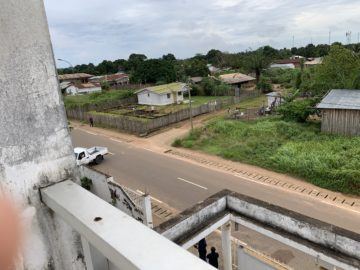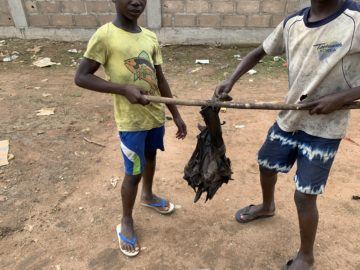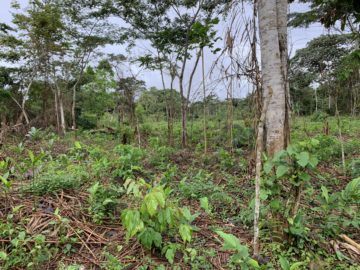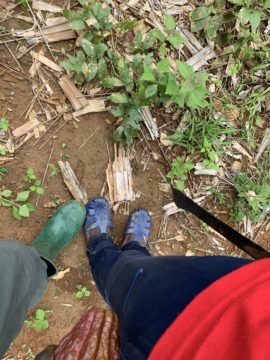by R. Passov
October 2019: Unnamed City, Central Africa – Day One
It’s nighttime. We tour the Unnamed City. Sebastian and I ride in the back of a black Toyota Land Cruiser. In front, Captain and Jannie, who for half his thirty years has been the only one who can drive Sebastian.
“I was in western Kenya,” I offer, “touring the farming made possible by seeds supplied by the non-profit, started by two young MBA’s from my country.”
“I am aware of the farms,” Sebastian says. “Are the farmers women?”
“Yes,” I say.
“Always women,” he says. “Always the women farm and the men leave.”
Dressed in clean blue jeans and a blue polo shirt, Jannie’s time in the city is measured by the belly he has grown since leaving the forest. Every time I look at him, he smiles. In the beginning I believe his smile is deference for the West.
“I found Jannie,” Sebastian explains, “after the last civil war. The one that cleared out the city, that destroyed all that he owned, pitting him against Captain. The same civil war that could start again at any moment.”
“Captain,” Sebastian adds, “was given to me by the army. A Lieutenant Colonel. Not just any Colonel. He is the Colonel sent by the President to find the last of the rebels from the civil war. Sent to find them in the jungle and to make sure they will never come back.”
Unnamed City – Day Three
Captain and Jannie arrive early in the morning. We head toward the airport anchored by a new hotel, built by the Chinese.
The hotel is two white, three story wings meeting to form a fallen V. “Two hundred rooms” Sebastian will say. “Two hundred rooms empty except for the few Chinese. A white elephant.”
The center piece of the lobby is a bar. Low slung, comfortable chairs in untarnished white leather. The walls hold the work of a local artist – paintings of women, etchings of women, bronze reliefs, all of women, all for sale.
Captain pushes the few English words he knows through his ever-present smile. We will wait he says, until the plane arrives.
In the airport Captain, hand on my elbow, guides me through a series of check points. Over and over a few questions are asked, then money is palmed.
The jacket Sebastien wears is a beautiful blue with rounded, sewn-on pockets and smart, tight lapels. I am dressed like an REI catalogue shopper, in the same pants I will wear as I follow Sebastien and Captain into the jungle. I envy the blue coat.
A uniformed man approaches, taking Sebastien by the elbow. I follow. Jannie is already on the plane, sitting in the next to last row. The last row is saved for us.
An announcement is made: “Mousier, Madams …” Sebastien offers that he wishes they not say everyone is to remain in their seats until the Minister deplanes.
It’s a two-hour flight to City #2. We are over small hills, covered in dense foliage. “It’s our forest,” Sebastien explains. “One of our national parks.” Then he prepares me for what we will see.
“There are hardwoods in this forest. But in the jungle where we will go, they have been taken.”
City #2 – Day One
A driver is waiting on the tarmac in the black Land Cruiser. He had driven all night. We travel a dirt road to a group of buildings. One is a two-story, oversized house. “This,”Sebastien tells me, “is the hotel where we will spend the night before going to my village.” We will be the only guests.
The building is white plaster, the wrong color in a jungle town. Moss, clay, soot everywhere. Inside the small entrance, two men stand next to a desk. Two others stand in front of the hotel, pretending to scan the horizon. If something happens I catch myself thinking, each will scatter to his side.
The hotel was built by Sebastien. On the right of the small entry is a dining area that opens onto an enclosed patio. A tall man dressed in dirty white chef’s garb emerges from a kitchen. His glasses are covered in sweat and steam. Our lunch is ready.
The chef once worked for Hilton. Now he works for Sebastien. We sit at a table on the outdoor patio. Tableware is arranged. Sebastien inspects a bottle of Champagne. He tells me the producer, then the vintage. I don’t know either but say because it is yours, it is fine.
Visitors arrive. An ancient man, dressed in rags holding a plastic bag filled with small, dried fish. He sits with us, speaking a constant stream of Swahili, drinking only seltzer.
He leaves. Sebastien offers that he always comes. Two other men arrive. Rounder men wearing sports coats. They are stopped at the entrance to the patio before Sebastien waves them through. The conversation is brief. Jannie appears, produces an envelope which the men take and then go. They do some work here, Sebastien explains.
We are in the cooler, drier months. I am comfortable under my hat, my ‘colonial’ hat as Sebastien will say. Our lunch begins with a platted fish salad, followed by the hind quarters of an animal. A Pangolin, Sebastien says. The meat, dark, reddish-brown, hard to the bone, tastes of oil.
After lunch, followed by two guards, we walk and smoke cigars. The town falls away. The dirt streets are empty. Every structure, new and old in the same time.
Across from the hotel we wade through tall grass toward what looks to be a one-car garage. It’s a palm oil factory. Our chef is there to greet us. A gas-powered generator runs inside the building, powering an arm that turns inside a large vat.
Sebastien does not give me a chance to be polite. “It is not right,” he says. “It is not right.”
The palm oil is from the farms we are to visit. Farms in the land Sebastien inherited from his father – an N’goma. Sebastien inherited all of the lands; he is the last N’goma.
City #2 – Day Two
We are on the new road in a caravan, Sebastien and I in the black LandCruiser, Jannie and Captain in a blue, double-cabin Toyota truck with big, off-road tires.
We head south but I think north, on the road built by the Chinese less than a year ago. Passed arteries cut into the jungle through which Chinese and Indonesian loggers transport spoils.
Passed a field in which two rows of wooden barracks face off. In between, skillfully parked earth-moving equipment rusts. Left by the Germans I’m told. For three decades the jungle has stayed back, leaving a warning for those to come.
Sebastien stops the caravan. We look at a river, thick with copper water. Full he says, of slag and poison from mines and yet also with villagers who have no choice but to bath and drink and wait and see.
In between the mud huts and children walking out of the jungle dangling bats, or men carrying headless monkeys, marking districts from which a minister hails, rise compounds that take time to drive passed, secured by fences, with lights and glass and trees.
Soon I will not want to see more jungle, will not want to see rotting trees and pineapple plants shorn of their fruit ahead of the harvest, to see where rows of corn might grow, to see the stores and petroleum stations that must be built to service those who will travel the new road, likely still to pass the homes of once and future Kings. Homes that will forever lay empty.
City #2 – Day Two, Afternoon
The jungle on either side is my height. Every so often a clearing reveals mud huts with thatched roofs. An open fire.
Children walk along the road, dangling prey. One boy, Sebastien exclaims, is dressed for his circumcision. I fail to see him.
When we drive slowly, I see people both surprised and anxious, as though they have been caught undressed. Instead, they have been caught in lives that no longer make sense.
Soon, Sebastien offers, trucks will drive to the river, to the ports, to the railroads. There will be stores, gas stations. Lights at night.
A half mile further and the blue truck turns off the road. We follow through small craters filled with rain water. Two hundred yards into the jungle we find a clearing. Three empty mud dwellings.
“These are now mine; this land too,” Sebastien explains. “My father was born here. My uncle just passed. Difficult man, my uncle. Very smart. But he chose to live alone. All of his life. Never with a woman. And now he has passed and these lands are mine.”
Which lands, I ask? We are in a clearing. How do you know which lands?
“Come,” Sebastien says, “I will show you.”
I follow Captain. His shirt, a small when it should be a large. His thin arms tightly gripped in deep-black cotton. His belly, forcing the shirt tails away from his jeans. If Captain is to lead, I think, I am ready for this hike.
But I am not. We enter a narrow foot path of slick clay that falls into the jungle. Sebastien follows a small man wearing plastic sandals, carrying the machete. I am behind Captain. Behind me, two who I realize are brothers.
The path narrows and curves, narrows and curves. My fellow hikers come in and out of view. Soon I am wondering how long.
It’s the night before this hike. Over dinner in his hotel I tell Sebastien that I am interested in the anthropology of computation. The pure pointlessness of my interest brings a smile to his face. “So,” he says, “tell me what is this, this anthropology of computation?”
Over our lifetimes – yours and mine as we are the same age – over the time since we met, something that was once so expensive is now free.
“And what is this that is now free?” he asks, politely challenging the answer to be of any interest.
Computation, I say, then remind him of when we stood together waiting for the VAX to have enough spare cycles to complete our simple regressions.
Now, computation is free. And the world is different.
After a smile, Sebastien speaks.
“Where we will go tomorrow, in my village, the people have no metric. There is nothing to count. In my tribe we have no words for a million, none for a thousand. If you ask for such a word, you will get nothing.”
We have found a new clearing. I am relieved we will go no further. “This,” Sebastien says, “is mine. This land is mine.”
We are in a space that is less jungle. I think of our conversation of the prior night, that his villagers have no metrics.
How, I ask, can it be possible to know where your land begins and ends.
“Ah,” he explains, “for us, a million exists. It’s from tree to tree. All in the village know. Pretending you have forgotten will get you killed.”
I try to follow Captain away from the clearing, back toward the mud huts, empty Sebastien explains because once they’ve been used, the villagers move. Captain glides from high point to high point. In rubber slickers given to me at the start of our trek I slide down the sides of craters getting one foot, sometimes both, caught.
I watch Captain smile and walk as though a boy. I am out of breath when I hear his voice. “Run!” he says, “run!”
A reddish-brown carpet undulates across my boots.
Sebastien echoes the command. “Run! If you run the ants will not climb inside your pants.”
Another conversation from the prior night returns. We have finished dinner on the second floor in a private dining room. Sebastien has just explained that since he cannot sleep past two AM he must retire early. I am going to shower, he says.
I remain at the table as he walks the few stairs toward his private quarters, then walk the hall toward my room.
“Oh my god. Oh my god. Stop! Stop!” Running down the hallway, once more he says oh my god. Then, as though the whole world were an amusement park, he laughs.
“We can’t shower. That is the worst thing. The ants,” he explains, “and especially the bees. They attack what is clean. If you go into the jungle after a shower, small bees and ants will attack everywhere. In your eyes, your nose, your mouth, your ears. All over.”
“We must smell,” he says. “That is how to survive in the jungle.”
Nairobi – Four Days before Unnamed City
I had heard too much about Nairobi, about the dangers of exploring the city. The concierge at the Sheraton, next to the airport where I waited for my flight to the farms in Kenya, kindly explained that it was not necessary to pay $80 dollars to be driven into town. We have Uber she said. Uber is safe.
The bar on the roof of the Sheraton looks out over Nairobi National Park. I had found an art gallery on the far side of the city. As we left the hotel, my Uber driver casually mentioned that every time he drives by, the park gets smaller.
Somehow, he said, it’s discovered that a new hotel has been built on lands that were not properly titled. There, in imagines on the internet stand the hotels, just in back of the Zebras.
This is the only road we can take for this stretch, my driver says, his English as relaxed as mine. We are going to be together for a while.
My driver’s name is Humphrey.
“Yes,” Humphrey smiles, “after your movie friend, after Humphrey Bogart and the African Queen and Casablanca. My father,” he offers, “loved everything American.”
And now? I ask.
“Now my father is dead and everything is Chinese. See the bed for the new road, running alongside this road. All Chinese workers.”
“The Chinese import their own food,” he said. “They want nothing to do with us beyond what they can take. Yes, we steel from ourselves and can’t build our own roads. But the Chinese are paying our politicians in order to lend us money to build roads with Chinese prisoners.
We want the Americans to come back. The US can’t build the roads because they don’t like corruption so much. But that does not bother the Chinese.”
He knows the founders of my country and yet he’s the first and only person in his family to finish high school. He wanted a college education but already there are too many Uber drivers with expensive degrees.
“Trump,” Humphrey says, “should be the president of an African country.”
Why? I ask.
“Because, like our leaders, he knows everything.”
